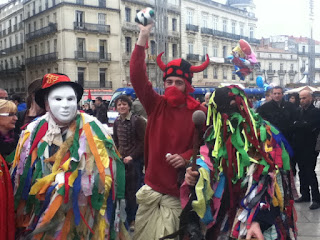My one-way ticket is booked, and I've sold my desk (among other things). I'm going to France!
For those of you who haven't already received an earfull from me about this project, let me do a brief rundown in FAQ form:
What is Occitan?
Occitan is a romance language spoken in parts of Southern France and Northern Spain. It is NOT a dialect of French, it is it's own distinct language. It's the language closest to Catalan, which I will get to learn a little bit of as well.
Are you going to be in Paris?
Sure, from time to time, but the bulk of my time will be spent in
Montpellier. This beach town on the Southern coast is also a big college town, where the Universite Paul-Valery has an Occitan department. I will be doing a condensed, two semester-long program for professionals wishing to learn the language to support their career goals. I'll even get to do an internship!
Why do you want to learn Occitan, anyhow?
The more I looked into doing this, the more reasons came bursting forth:
a. It's an excuse to spend time in France (and get fluent in French already!).
b. My family comes from not-too-far-away in the Pyrenees---and some cousins speak Occitan!
c. I'll get to perform
Les chants d'Auvergne in the very region they depict, having gained a rich knowlege of the language, culture, and folk music traditions.
What are Les chants d'Auvergne?
The Songs of the Auvergne, are a series of orchestrated folk songs, collected and set by Joseph Canteloube in the 1920's. If you're not already familiar with them, I highly recommend YouTubing
"Bailero." Further discussions of these EXQUISITE songs will appear in later posts, and I invite commentary.
SO, that's the gist of it. Please feel free to post comments, ask questions, and send your general good wishes!
I look forward to sharing this journey with all of you who won't quite fit into my suitcase to come along. :)
Cheers,
Alexis






